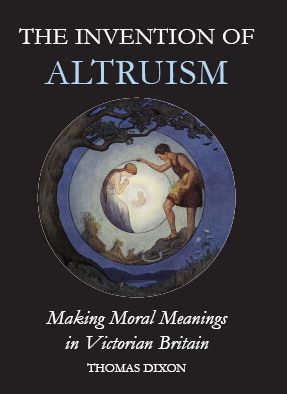[W]ithin groups selfish individuals beat altruistic individuals, but groups of altruists beat groups of selfish individuals.
E. O. Wilson, “Evolution and Our Inner Conflict“
Filed under: Miscellaneous Tagged: altruism, e o wilson
[W]ithin groups selfish individuals beat altruistic individuals, but groups of altruists beat groups of selfish individuals.
E. O. Wilson, “Evolution and Our Inner Conflict“
In a contrapuntal coincidence, November 13—World Kindness Day—coincided with the publication of Pathological Altruism. Even pre-publication, this seemingly mild-mannered edited volume has served outsize duty in rattling the very foundations of our national culture of caring.
Mark Twain House and Museum controller Donna Gregor, for example, recently hit the news in a big way because she admitted to embezzling $1 million over eight years from one of Hartford, Connecticut’s major cultural institutions, where Twain had lived after the Civil War. Gregor’s lawyer and her psychologist cited pathological altruism as a reason that Gregor, a 54-year old grandmother, should be spared prison. Gregor was compelled to steal, they argue, by her obsession to help her deeply troubled, extended family.
Pathological altruism is, in a great sense, the study of the onramps to the well-intentioned road to hell. That is, it is the study of truly well-meaning behavior that worsens instead of improves a situation, or creates more problems than it solves. Does the concept of pathological altruism then provide a license to steal—as long as it was done for a good cause? Not so fast. If Gregor personally profited from the embezzlement, instead of or in addition to, serving as a sort of nepotistic Robin Hood, she’s very probably a con artist. Pathological altruism distinguishes such obviously self-serving behavior—and in any case, does not excuse it.
In fact, the new research area of pathological altruism provides a valuable new scientifically-based framework for understanding—albeit not justifying—some of the most important recent events now dominating the news. Public union members protest that their salaries aren’t high enough? On the face of it, their arguments sound reasonable—who could be against reasonable wages for teachers and police? But by the time you add up all the “reasonable” wages, from hundreds of different unions, ignoring the union’s well-meaning attempts to protect their members, which block meaningful reform and allow for a wide range of incompetence and malfeasance, a state could become bankrupt. In fact, by focusing on the individual “obviously” beneficial outcomes for each of the public unions, the much bigger, far worse outcome—a bankrupt state—is missed. It’s rather like saying yes to every request for cookies from a small child—and ending up with an obese adult. In just such a fashion, underpinned with many similar pathologically altruistic financial choices, the European Union is falling into disarray.
The concept of pathological altruism even explains why the concept of pathological altruism has itself been attacked. Who, you might ask, could assail the common sense idea that self-righteous individuals can get carried away by their own convictions, losing sight of the harm they might cause through their efforts to help others? Why, precisely those self-righteous sorts who form one aspect of pathological altruism! These happy helpers are certain, at the deepest core of their being, that they are helping—the idea of objective analysis of the results of their efforts leaves them a queasy feeling. In this sense, altruism has become a central dogma of a new stealth religion—religions, remember, are often based on dogma that is not to be questioned.
Modern psychology has made much hay of the fact that altruistic acts increase our own happiness in a profound way. But psychologists ignore the corollary to this idea—that in today’s increasingly narcissistic world, many are focused on “altruism” that makes them feel good, and that allows them to ostentatiously flaunt their do-gooder status. Such altruism isn’t really altruism at all—i
Following from Thomas Dixon’s previous very popular post for OUPblog, he has very kindly agreed to write another article for us. Here he reflects on the recent interviews conducted with the two Presidential hopefuls at the Saddleback ‘Civil Forum on the Presidency’ in terms of Christianity as an altruistic or individualistic faith. Thomas Dixon is Senior Lecturer in History at Queen Mary, University of London, and is the author of Science and Religion: A Very Short Introduction and The Invention of Altruism.
 There has been an outbreak of altruism in the race for US President. During interviews with the influential evangelical pastor Rick Warren at the Saddleback ‘Civil Forum on the Presidency’, Barack Obama and John McCain spoke about their selfless motives for seeking to become the most powerful man on earth. Both Presidential candidates had done their homework. They knew what their interviewer and his congregation wanted to hear. Warren’s multi-million-selling book, The Purpose Driven Life, begins with the words, ‘This is not about you.’
There has been an outbreak of altruism in the race for US President. During interviews with the influential evangelical pastor Rick Warren at the Saddleback ‘Civil Forum on the Presidency’, Barack Obama and John McCain spoke about their selfless motives for seeking to become the most powerful man on earth. Both Presidential candidates had done their homework. They knew what their interviewer and his congregation wanted to hear. Warren’s multi-million-selling book, The Purpose Driven Life, begins with the words, ‘This is not about you.’
Whether Christianity is in fact a religion of altruism, rather than individualism, is an interesting question. Historically both believers and skeptics have recognized the self-interested character of Christian teaching. When Jesus told the rich young man to sell all he had and give it to the poor, this was for the good of the young man – so that he would have ‘riches in heaven’ – rather than for the good of the poor. Oscar Wilde approvingly described Jesus as ‘the first individualist in history’. And Obama and McCain both told Rick Warren that being a Christian meant that they were, as individuals, saved from their sins, forgiven, redeemed. But the keynote of the Saddleback Forum, reflecting Warren’s own interpretation of Christianity, was self-denial rather than self-fulfillment, sacrifice rather than salvation.
So, how do the two candidates’ versions of Christian altruism compare? John McCain, whose sacrifices in Vietnam are well known, stated he wanted to ‘inspire a generation of Americans to serve a cause greater than their self-interest’. He wants Americans to ‘put their country first’. He also suggested that throughout their history ‘Americans have gone to all four corners of the world and shed blood in defense of someone else’s freedom’, and contrasted this with Russia’s allegedly self-interested pursuit of energy through its campaign in Georgia. This is implausible. American and Russian foreign policy are both clearly driven by national self-interest, and by the need to secure access to energy.
 In fact, McCain’s ideology is a classic example of what scientists call ‘in-group altruism’ combined with ‘out-group hostility’. McCain’s Christian love does not extend to America’s enemies: ‘If I have to follow him to the gates of hell, I will get bin Laden and bring him to justice.’ His criterion for risking American troops is not actually the defense of someone else’s freedom, but ‘when American national security interests are threatened’. And even in terms of domestic policy, McCain has not forgotten about individual self-interest altogether: ‘I want everyone to get rich. I don’t believe in class warfare or redistribution of the wealth.’
In fact, McCain’s ideology is a classic example of what scientists call ‘in-group altruism’ combined with ‘out-group hostility’. McCain’s Christian love does not extend to America’s enemies: ‘If I have to follow him to the gates of hell, I will get bin Laden and bring him to justice.’ His criterion for risking American troops is not actually the defense of someone else’s freedom, but ‘when American national security interests are threatened’. And even in terms of domestic policy, McCain has not forgotten about individual self-interest altogether: ‘I want everyone to get rich. I don’t believe in class warfare or redistribution of the wealth.’
Obama, in contrast, favors higher taxes for the wealthy and empathy with the poor. His mother had always told him, he said, when he had been mean to anyone, to ‘imagine standing in their shoes, imagine looking through their eyes.’ This principle of empathy, he said, was what had ‘made America special’. ‘I think about my grandparents’ generation’, he went on, ‘coming out of the Depression, fighting World War Two. They were confronted with some challenges we can’t even imagine. If they were willing to make sacrifices on our behalf’, he concluded, ‘we should be able to make some sacrifices on behalf of the next generation.’
While McCain envisaged Americans exchanging self-interest for national interest, Obama seemed to be thinking of something a little broader – the responsibility of the current generation of humanity to the next. Obama’s echoing of the gospel precept, ‘whatever you do for the least of my brothers you do for me’, also had a different ring from McCain’s wish for everyone to get richer.
The advice Obama got from his mother immediately reminded me of one of the humorist Jack Handey’s aphorisms: ‘Before you criticize someone’, Handey said, ‘you should walk a mile in their shoes. That way, when you do criticize them, you’ll be a mile away and you’ll have their shoes.’ Handey’s surrealism hints at a serious point – altruism and empathy are often little more than an attractive veneer for low cunning and self-interest. Altruism is a favorite topic with scientists too. Whether they worry about the fact that we are driven by ‘selfish genes’ against which we need to rebel, as Richard Dawkins suggested in the 1970s, or think that altruism is in fact a ‘blessed misfiring’ that is built into those genes, as Richard Dawkins now maintains, no-one doubts that we all have evolved the ability to do good both for others and for ourselves. What is less obvious is whether it is better, overall, for me to pursue my own interest, on the theory that my health and happiness will be indirectly good for others too, or better for me to pursue the good of those others directly. The former is McCain’s favored approach, the latter Obama’s.
Although Presidential candidates’ paeans to self-sacrifice and altruism may ring hollow, perhaps politicians are simply telling us what we want to hear – that we, like them, are motivated by a humanitarian love of others, not a selfish love of lower taxes or cheaper energy. Voters may be happy to accept this sort of flattery but I think they should pause when they hear politicians celebrating self-sacrifice – whether in the alleged interest of America or of the wider world – and ask themselves what price they and others are really being asked to pay, and for whose ultimate good. It is because it sounds so wholesome that altruism can be such a dangerous ideology.
You can read a full transcript of Rick Warren’s interviews with Barack Obama and John McCain, which took place on 16 August 2008, on the CNN website.